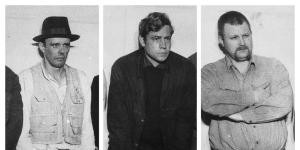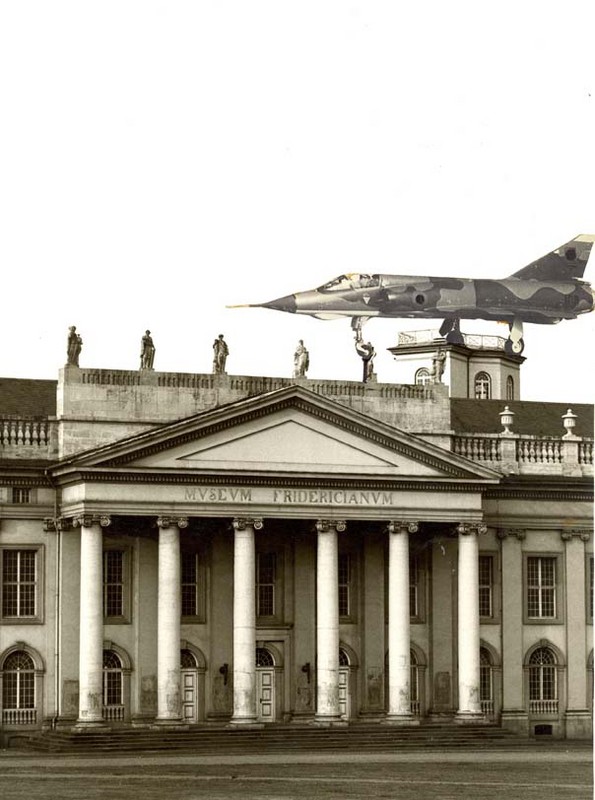Film screenings & Panel Discussions: Beuys Brock Vostell
17 - 19 Oct 2014
Oct-17
The exhibition »Beuys Brock Vostell« focuses on the Actions of the 1960s and 1970s. The film »Happening, Kunst, Protest 1968« (1981), by Helmut Herbst combines recordings of important Happenings of the period including statements by participating artists, and thus offers an artistic perspective on performative works and their contemporary context. The so-called »24-Hour« Happening (1965) in which Joseph Beuys as well as Bazon Brock and Wolf Vostell collaborated serves as a key example.
Art theorist and psychologist Friedrich Wolfram Heubach will be available for discussion following the film presentation. Heubach is author of the script of »Happening, Kunst, Protest 1968« and has been part of countless Happenings as active participant and spectator. As founder and publisher of the avant-garde journal »Interfunktionen« (1968–1975) he knew Beuys, Brock and Vostell in person.
To round off the evening, there will be a screening of »Deutschland dada« (1968/69), the first film in Helmut Herbst’s triology entitled »Kunstgeschichte des 20. Jahrhunderts«, to which, in addition to »John Heartfield, Fotomonteur« (1977) »Happening, Kunst, Protest 1968« also belongs.
---
Oct-18
The second film evening on the exhibition »Beuys Brock Vostell« focuses on Wolf Vostell. The two renowned filmmakers Ulrike Ottinger and Rudij Bergmann have each made independent filmic contributions on the work of Wolf Vostell.
Ulrike Ottinger produced a documentary film on the Happenings »Schnee«[Snow] (1972) and »Berlinfieber« [Berlin Fever ] (1973). The artist had previously exhibited Wolf Vostell in 1971 in the gallery and edition »galeriepress« she founded in Konstanz, and was a close friend.
In his television series Rudij Bergmann made his own contributions dedicated to Wolf Vostell. In the four-part documentary »Nackt ist die Kunst« [Art is Naked ] (ARTE, 2006), he presented the installation »Heuschrecken« [Grasshoppers] (1970) as an early attestation of media art; in the eighth edition of »BergmannsArt« (SDR, 1997), he turned his attention to Vostell’s artistic critical examination of the Shoa. With »Leben ist Kunst. Kunst ist Leben« [Life is Art. Art is Life] (NDR, 1988) Bergmann realized a filmic portrait of the artist.
Ulrike Ottinger and Rudij Bergmann give detailed explanations of their film in discussion with Peter Weibel, and will respond to questions.
---
Oct-19
The third and final part of the accompanying film program on the exhibition »Beuys Brock Vostell«, comprises two artist portraits by Werner Krüger.
With »Joseph Beuys: Everyone is an Artist« from 1979, Krüger had already conceived of and realized a film presenting the various facets of the artist’s person and work. In addition to the statements of eye-witnesses and newspapers, the film also contains numerous recordings documenting his Actions.
The film »Parzival in der Extremadura. Wolf Vostell – Happenings & Fluxus« from 2010, which had hardly been screened before, collates film material produced over two decades, including commentaries by friends and colleagues, recordings of artists at work, and pictures of the locales of his Happenings.
The exhibition »Beuys Brock Vostell« focuses on the Actions of the 1960s and 1970s. The film »Happening, Kunst, Protest 1968« (1981), by Helmut Herbst combines recordings of important Happenings of the period including statements by participating artists, and thus offers an artistic perspective on performative works and their contemporary context. The so-called »24-Hour« Happening (1965) in which Joseph Beuys as well as Bazon Brock and Wolf Vostell collaborated serves as a key example.
Art theorist and psychologist Friedrich Wolfram Heubach will be available for discussion following the film presentation. Heubach is author of the script of »Happening, Kunst, Protest 1968« and has been part of countless Happenings as active participant and spectator. As founder and publisher of the avant-garde journal »Interfunktionen« (1968–1975) he knew Beuys, Brock and Vostell in person.
To round off the evening, there will be a screening of »Deutschland dada« (1968/69), the first film in Helmut Herbst’s triology entitled »Kunstgeschichte des 20. Jahrhunderts«, to which, in addition to »John Heartfield, Fotomonteur« (1977) »Happening, Kunst, Protest 1968« also belongs.
---
Oct-18
The second film evening on the exhibition »Beuys Brock Vostell« focuses on Wolf Vostell. The two renowned filmmakers Ulrike Ottinger and Rudij Bergmann have each made independent filmic contributions on the work of Wolf Vostell.
Ulrike Ottinger produced a documentary film on the Happenings »Schnee«[Snow] (1972) and »Berlinfieber« [Berlin Fever ] (1973). The artist had previously exhibited Wolf Vostell in 1971 in the gallery and edition »galeriepress« she founded in Konstanz, and was a close friend.
In his television series Rudij Bergmann made his own contributions dedicated to Wolf Vostell. In the four-part documentary »Nackt ist die Kunst« [Art is Naked ] (ARTE, 2006), he presented the installation »Heuschrecken« [Grasshoppers] (1970) as an early attestation of media art; in the eighth edition of »BergmannsArt« (SDR, 1997), he turned his attention to Vostell’s artistic critical examination of the Shoa. With »Leben ist Kunst. Kunst ist Leben« [Life is Art. Art is Life] (NDR, 1988) Bergmann realized a filmic portrait of the artist.
Ulrike Ottinger and Rudij Bergmann give detailed explanations of their film in discussion with Peter Weibel, and will respond to questions.
---
Oct-19
The third and final part of the accompanying film program on the exhibition »Beuys Brock Vostell«, comprises two artist portraits by Werner Krüger.
With »Joseph Beuys: Everyone is an Artist« from 1979, Krüger had already conceived of and realized a film presenting the various facets of the artist’s person and work. In addition to the statements of eye-witnesses and newspapers, the film also contains numerous recordings documenting his Actions.
The film »Parzival in der Extremadura. Wolf Vostell – Happenings & Fluxus« from 2010, which had hardly been screened before, collates film material produced over two decades, including commentaries by friends and colleagues, recordings of artists at work, and pictures of the locales of his Happenings.


